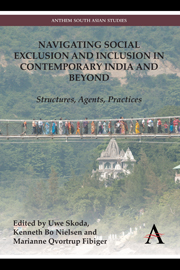 Navigating Social Exclusion and Inclusion in Contemporary India and Beyond
Navigating Social Exclusion and Inclusion in Contemporary India and Beyond from Part II - Communities and Politics
Published online by Cambridge University Press: 05 September 2013
Since the early 1990s India's move towards economic reforms and marketization has contributed to its ‘rise’ on the global economic landscape. This ‘rise’ of India is attributed to the adoption of liberalization policies, which are also expected to eliminate discrimination based on caste, religion and gender. Since economic liberalization enhances competition among firms, scholars have argued that more emphasis will be placed on ‘efficiency and skill’ while recruiting a worker rather ‘than the caste of the worker and his loyalty to the firm’ (Panini 1996, 60). This claim is not new. Modernization theorists have long argued that industrialization and urbanization, and the associated ideas of modernity, such as the rationalities of the state, big businesses and planned development will reduce the influence of social institutions such as caste, religion and language (e.g. Srinivas 1969, 270).
In contrast to this view, recent studies have demonstrated that social institutions such as caste and religion continue to play a significant role in the economy, especially in deciding the life chances of individuals (e.g. Thorat and Newman 2010a; Harriss-White 2003). Thorat and Newman's (2010b, 23) study on economic discrimination in the formal urban labour market offers evidence of continued discriminatory barriers for highly qualified Dalits and Muslims. These empirical findings suggest that economic liberalization is not contributing to the dissolution of social institutions such as caste, religion and gender in the labour process.
To save this book to your Kindle, first ensure [email protected] is added to your Approved Personal Document E-mail List under your Personal Document Settings on the Manage Your Content and Devices page of your Amazon account. Then enter the ‘name’ part of your Kindle email address below. Find out more about saving to your Kindle.
Note you can select to save to either the @free.kindle.com or @kindle.com variations. ‘@free.kindle.com’ emails are free but can only be saved to your device when it is connected to wi-fi. ‘@kindle.com’ emails can be delivered even when you are not connected to wi-fi, but note that service fees apply.
Find out more about the Kindle Personal Document Service.
To save content items to your account, please confirm that you agree to abide by our usage policies. If this is the first time you use this feature, you will be asked to authorise Cambridge Core to connect with your account. Find out more about saving content to Dropbox.
To save content items to your account, please confirm that you agree to abide by our usage policies. If this is the first time you use this feature, you will be asked to authorise Cambridge Core to connect with your account. Find out more about saving content to Google Drive.